Claude Longley Simpson: Soldier and Policeman
The Japanese bombed Darwin on February 19, 1942 in two raids, the first lasting forty minutes and the second about half that time. Chaos reigned with at least 243 deaths amongst the civilian and military populations, eight ships sunk in the harbour and both military and civilian establishments destroyed. A large number of Darwin’s residents fled south expecting the imminent arrival of a Japanese invasion, a situation that did not happen as this was not part of the Japanese’s plan. Nevertheless, control and order had to be re-established in the town. Major Claude Simpson, previously a member of the Victorian Police Force, who had just returned to Adelaide with the 2/8th Infantry Battalion from service in the Middle East, Greece, Crete, Palestine and Syria, was ordered to Darwin to assist in the restoration of order and discipline amongst both the civilian and military populations.
Born in Leeds, England on April 21, 1909 to Eliza Longley and George Simpson, Claude came to Australia with his parents when a few weeks old. His father had been a detective in the Leeds police force but came to Australia seeking a better life for himself and his family. After some work on construction sites he joined the Victorian police force, where at that time conditions were very poor, and later became a member of the Police Association. Becoming a member of the executive of the association he was seen to be one of the ‘stirrers’ in an organization demanding improvements for its members. The Chief Commissioner, fearing a strike, posted all members of the executive to distant places in Victoria. While this did not prevent the eventual strike it meant that the Simpson family was broken up. Claude and his mother, two sisters and two brothers remained in Williamstown while his father took up his posting in Mildura where family accommodation was not available.
As Claude explained in an interview with H Martin, police pay was poor and it was a struggle for the family to survive. New clothes were a luxury and when the fortnightly cheque arrived from his father he would go around and pay money owing to the grocer, butcher and everyone else. He especially recalled the grocer who always gave him a little bag of lollies when he paid the account. [1]
Later the family moved to Castlemaine where nine-year-old Claude had the responsibility of milking the family cow night and morning. He continued his schooling at the Castlemaine State School and then moved to the Junior Technical School. When thirteen he was recommended by the school principal for a position with the Thompson’s Pipe Company who wanted a ‘reliable lad’. A major attraction of the position was the guarantee given to the school principal that when Claude reached the appropriate age the company would indenture him as an apprentice. Initially Claude gave up his paper round as he started work at the foundry at 7.30 but when the newsagent found it difficult to get a replacement he suggested to Claude that he could do both jobs. As the train with the newspapers arrived at the station at 5 o’clock in the morning he had time to collect and deliver them before he started his day’s work. Between delivering the papers and commencing work at the foundry Claude was able to return home to have his breakfast.
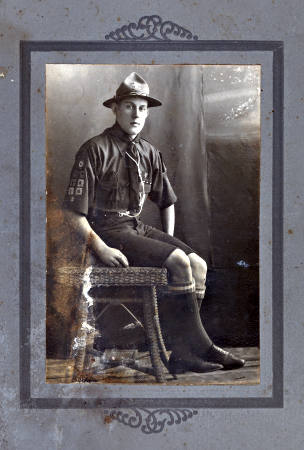
Claude Simpson as a member of a Castlemaine Scout Troop.
Claude completed his apprenticeship but only just. During the last year of his apprenticeship the company had difficulty finding work for its staff. Claude recalled apprentices were filling in their time by sweeping the floor. At this stage he was boarding in Castlemaine as his father had received promotion and the family had moved to Northcote. With the lack of work Claude rejoined his family but continued with an interest that had developed while living in Castlemaine. This was military service.
For a time military service was compulsory for young boys. At fifteen boys enrolled with the senior cadets and at sixteen joined the militia. Senior cadets were drilled by warrant officers from the Australian Instructional Corps and undertook physical training. By the time Claude was seventeen compulsory military services was abolished but he had attained the rank of sergeant so he was interested in continuing.
Moving to the family at Northcote, Claude transferred from the 7th Battalion at Castlemaine to the 57th Battalion at Preston where he soon obtained a further promotion to warrant officer. Promotion beyond that level seemed unattainable to Claude as his commanding officer believed that a public school education was necessary for anyone aspiring to a commission. However, the situation changed when a new commanding officer was appointed. With encouragement Claude Simpson sat the necessary examinations and received his commission as a lieutenant. He later explained it was a pretty tough thing for him to write a proper essay, as he didn’t have much education.
Military training continued. Members of the battalion would meet on a regular basis and almost every second weekend would assemble to discuss tactics or some other military topic. Often they would go away for the weekend boarding somewhere in Victoria. Every year there would be a fourteen day annual camp for members of the battalion although Claude Simpson could not always attend as he had commitments with his employer. Nevertheless he always managed to get fourteen days with some other unit.
In 1933 Claude Simpson entered the Police Depot in St Kilda Road as a recruit and after completing initial training on July 20, 1933, was assigned to ‘foot duties’ at the Russell Street Police Station. Less than two months later he was sent back to the Depot for temporary duties as Assistant Drill Instructor and remained there until January 12, 1937.
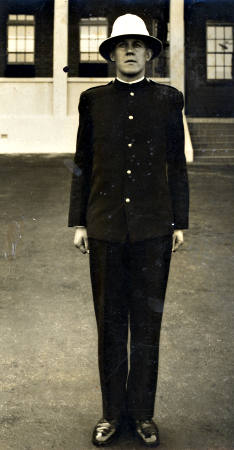
Claude Simpson at the Police Depot, c1933. Courtesy Rowan Simpson.
It was while Claude was undertaking his initial training at the Police Depot that the Drill Instructor took ill and Claude, because of his military training, was assigned to take over that role for his intake. He explained he attended education and law lectures along with all members of his group and would then take them for drill and physical training. During a second term at the Depot he continued to assist the Drill Instructor with recruits and was given the responsibility of taking older uniformed policemen for drill as Thomas Blamey, the Chief Commissioner, had issued instructions that older policemen should attend for two hours of drill a month. [2] In January 1937 Constable Simpson returned to duties at Russell Street police station but stayed less than two months before returning to the Police Depot to resume his former responsibilities.
It was on February 3, 1937 Claude Simpson received his commission as a Lieutenant in the Australian Military Forces. A few years after this Adolph Hitler invaded Poland and Britain declared war on Germany. Australia followed suit. The Australian Prime Minister, Robert Menzies, announced in a nationwide radio broadcast, “It is my melancholy duty to inform you officially that in consequence of a persistence by Germany in her invasion of Poland, Great Britain has declared war upon her, and that as a result Australia is also at war.” Six days later, on September 15, it was further revealed that Australia would raise a special force of 20,000 men for service at home or abroad to be known as the Sixth Division. At the same time the militia would be called up for a month’s training in two drafts each of 40,000.
On October 24, 1939 at South Melbourne, Claude Simpson responded to the call for volunteers for the Australian army and was selected to be one of the officers in the 2/8th Infantry Battalion, one of several battalions forming the Sixth Division. [3] Lieutenant Simpson was paraded along with other volunteers for the Sixth Division at the Melbourne Showgrounds. It was there that the troops were fitted out with their uniforms but as Simpson explained, “it went off half cocked.” Some were fitted out with hats, boots and pants, and some with jackets. Nobody had a complete uniform. “They looked terrible,” was Claude’s comment.

Volunteers to 2/8th Battalion prior to moving to Melbourne Show Grounds. Lieutenant Claude Simpson in uniform at far left. Courtesy Rowan Simpson.
The following day the newly enlisted troops commenced their journey to the camp at Puckapunyal via Seymour by rail. Claude Simpson was assigned the task of commanding the move. Realising there could be unfortunate consequences if the bar was open when they arrived at Seymour, Lieutenant Simpson ordered it closed but an officer from Puckapunyal countermanded this order and as a result some soldiers became a little inebriated. Despite this the troops were assembled into columns and began the march to Puckapunyal. A little outside Seymour sandwiches and tea was provided and an old soldier from World War One arrived in a horse drawn wagon with cases of soft drink for sale. When the soldiers returned their bottles to claim the normal refund of one penny they were told ‘No refund’. This infuriated some of the men who responded by smashing the bottles on the side of the road. Lieutenant Simpson annoyed by the whole situation ordered the column of soldiers to march without stopping until they reached Puckapunyal. [4]
During this ‘forced march’ an old digger pointed out to Simpson that the time was ten minutes to the hour and therefore the time for a spell. Irrespective of the time of commencing a march the army regulations stated that a rest was compulsory at ten minutes to the hour. Lieutenant Simpson ignored the regulation and despite the threat of the digger that he would be reported and the fact that some men were dropping out, the column kept moving. Half a mile from Puckapunyal the column was met by the 5th Battalion pipe band so there was a pause to allow a little reorganisation giving time for the stragglers to catch up. This resulted in Simpson delivering a full complement on arrival at Puckapunyal where his commanding officer, Lieutenant Colonel Mitchell congratulated him and told him not to worry about any report for breaking regulations. [5]
Claude Simpson’s stay at Puckapunyal was very short as he was selected to join an advance party of Australians totalling fifty officers and sixty other ranks who together with a similar party of New Zealanders sailed on December 15 in the Stratehallan for Palestine. Their objective was to reconnoitre a training area and prepare for the reception of the remainder of the force. [6] Prior to leaving Melbourne Claude was given a week’s leave and on the boat was given the task of taking officers and other ranks for physical education each day. It was all part of keeping them entertained, as something had to be done with them was Claude’s comment. [7]
Initially Claude was assigned to British army units in Palestine but with the arrival of the Australian units he returned to the 2/8th Battalion where he was promoted to captain and appointed officer in command of a company. [8] From Palestine the battalion moved to Egypt for further training in the desert before moving to Bardia, fifteen miles beyond the Egyptian frontier. There they rounded up four or five hundred prisoners but never tangled with the enemy as they were part of the reserve. From Bardia the unit moved sixty miles further west to Tobruk where they engaged the Italians. Later they moved through Derna to Benghazi before being relieved and returning to Alexandria to be issued with old type digger uniforms. Up to that stage they had been wearing shirts and shorts. A few days later they were put on boats and landed in Athens.
When asked about food while in action in the desert, Claude said bringing ammunition forward was the priority, not food. “Our water bottles were filled up at night-time but that was all the water you had for the day. We would use this to shave and wash ourselves. We would wash only our faces with the shaving brush. For food we had hard rations which consisted of biscuits and bully beef. We had no proper food until we left the fighting zone. We would share a tin of bully beef but I couldn’t eat it, because in the heat of the desert it was floating in oil. I lived on the army biscuits.” [9]
The Greek campaign arose from a promise by Winston Churchill to the Greek government to provide assistance should they be invaded. In his planning he included the 6th Division. This involvement was later described as a strategic blunder of the first order as the troops were embarking on a venture they had no hope of winning. [10]
Claude recalled that on arrival in Greece the battalion camped at a lovely place called Daphni and it was from there they travelled in funny little carriages, more like cattle trucks, to Larisa. “As we passed the little stations I can remember women there with arms full of lilacs to welcome us. They thought we were going to save them but we were lucky to save ourselves.” After arriving at their assigned positions the battalion was ordered to new positions to face the German army advancing through Yugoslavia. The resistance of the Yugoslav army had collapsed.
The battalion took up its new position on hilltops during the dusk of the evening and could see the Germans advancing in the valley. “There appeared to be thousands of them with artillery and everything,” said Claude. During the three days they were there is snowed. Food was scarce as the priority was to get ammunition to the troops in their mountainous position. At the end of this time plans were being made for an orderly withdrawal but before they could be implemented the Germans overran the forward companies. “It became a bit of a shambles as you got out the best you could,” was Claude’s comment, recalling that the members of one of his platoons were taken prisoner. At the Aliakmon River the engineers had blown up the bridge leaving Simpson and many Australian troops on the wrong side. Fortunately the Australian engineers realized the problem and constructed a ferry, “a bit like a flying fox,” Claude said, to get them out.
In late April 1941 the evacuation of the battalion from Greece occurred at Kalamata where half of the troops boarded the Costa Rica, a Dutch transport, and the other half aboard the City of London. The Costa Rica suffered damage from an air attack and those individuals aboard were transferred to the attending destroyers Defender and Hereward. Those who had been aboard the Costa Rica disembarked at Crete where they were again subjected to the onslaught of the German military force and possible capture. Simpson along with the others survivors of the Greece campaign went on Alexandria where he was seconded to the 6th Division Headquarters.
Before the battalion moved to Syria Claude Simpson was appointed as Deputy Provost Marshal by General Herring with the task of recruiting and reorganising the Provost Company of the 6th Division. The military police or ‘provos’ were responsible for traffic control along supply routes and were also charged with enforcing discipline and investigating crimes. During the withdrawal from Greece the provost company had the task of directing the troops to places of embarkation. As Simpson explained troops could only travel at night because the German air force was activity during the day and as there were roads everywhere guidance was needed. “We wouldn’t have known where to go if it hadn’t been for the 6th Divisional provost fellas standing there with hurricane lamps directing us. The result was that most members of their show were taken prisoner in Greece.” [11]
After three months with the Provost Company and Divisional headquarters Claude Simpson returned to his battalion and subsequently boarded the Aronda with them to return to Australia. (He was appointed OC of 6 Div Prov Corp 8/6/41 and ceased this secondment on 15/9/41 to return to his battalion and its actions in Syria.) Disembarking at Adelaide in March 1942 Captain Simpson at this stage commanded C Coy but by the beginning of April he was promoted to Temporary/Major and appointed Deputy Assistant Provost Marshall of the Seventh Military District in Darwin. He left the battalion to take up his new responsibilities on April 11, 1942 a few months after the fall of Singapore when General Percival surrendered the garrison to the Japanese on February 15, 1942 and the bombing of Darwin by the Japanese four days later.
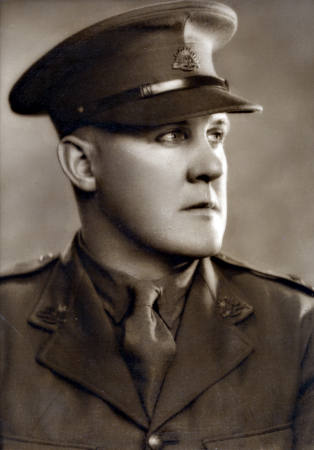
Major Claude Simpson. Courtesy Rowan Simpson.
After the air raid people left Darwin by every available means including foot and bicycles, leaving shops and offices unattended. By February 20, Lockwood, [12] estimated that not more than five hundred civilians remained in the town. Few were former permanent residents. Left behind was decaying food, homeless cats and dogs, and starving caged birds. [13]
On the night of the February 19, 1942 looting broke out in some of the business premises and sporadic looting occurred thereafter. This looting was indulged in both by civilians and members of the military forces including military policemen. [14] The army was unable to control its troops . Looting was rife. The Official War History summary included the observation “The poor quality of the Provost Corps stationed in the area was noticeable. This unit did not operate in a praiseworthy manner.” On February 21, 1942 Darwin was placed under military control. [15]
Mr Justice Lowe of the Victorian Supreme Court was appointed by the Federal Government to inquire into the circumstances of the February 19 raids. [16] He wrote two reports for the government, one on March 27 and a second on April 9, 1942. In these reports he was highly critical of both the administration and the military command. [17]
Major General E Herring was assigned the command the 6th Military Division in Darwin on April 9, 1942 when General Blamey restructured the Allied Land Forces in Australia. Three days later, the now Major Simpson, was on his way to take up new responsibilities in Darwin but he was not happy. He wanted to remain with his battalion. He was met at the airport by General Herring’s aide-de-camp and taken to the general. Simpson recalled, “General Herring was a pretty shrewd bloke. I walked into his tent and he said, ‘Just a minute Simpson. Before you say anything go and have some breakfast with my ADC who will take you around Darwin. When you’ve had a good look around come back and see me’.”[18]
“I went and had breakfast and went and saw the Darwin Hotel. When it was being built it was said to be one of the best hotels in the southern hemisphere. Now all the chrome work was pulled off the walls, all the lights and windows were broken. Everything was smashed. Now the Japs didn’t do that. We went down the town and all the shops were raked, shops had materials that were just thrown on the floor and trampled on. Japs did not do that.” When taken to the camp where the provosts were billeted Simpson was informed there were no officers, and that a corporal and his section were responsible for patrolling Darwin. The corporal when called, according to Simpson, spoke in a disrespectful manner reflecting lack of discipline in the unit. With these experiences he returned to General Herring to report the existing disgraceful situation and his willingness to proceed with his new duties. [19]
Later General Herring called Simpson to check out Mount Isa. He was given to understand that the American troops there were scaring people when walking down the footpath and forcing them to walk in the gutter. Major Simpson spoke with an American friend who advised him to take a couple of good blokes over with him and walk down the street and confront them. “If you have any trouble shoot the bastards.” [20] After arrival and walking around the town, Simpson observed the seven foot tall Afro-Americans walking down the centre of the footpaths not disturbing anyone but with local people getting out of the way when these large men approached. Ignoring the advice of his friend to shoot them he decided to use bluff. Simpson divided his small group of military police, with their red armbands of authority, into two team. The teams then proceeded to walk around the town commandeering the centre of the footpaths forcing approaching Americans to move aside. There was no trouble at all. Some members of the team remained for a time at Mount Isa to patrol the streets until the local people became more familiar with the American troops and gained confidence to just walk down the street while the Americans learned to share the footpath.
In February 1943 Claude Simpson completed his secondment to the Provost Company and returned to his battalion, then stationed in the Northern Territory, to take command of C Company. [21] In May of that year Major Simpson embarked with his battalion on the HMT Duntroon for Queensland where they engaged in further training at Flaggy Creek and Herberton. [22] Following an extensive period of jungle training the battalion embarked on November 7, 1944 on the American liberty ship the Thomas Corwin for New Guinea to confront the Japanese at Aitape. [23] There they were part of the Sixth Division pushing forward through the difficult jungle terrain, broken by rivers, creeks and gullies that impeding progress towards Wewak. The battalion suffered casualties with men being killed and wounded but on May 25, 1945 Wewak fell to the Australian troops.
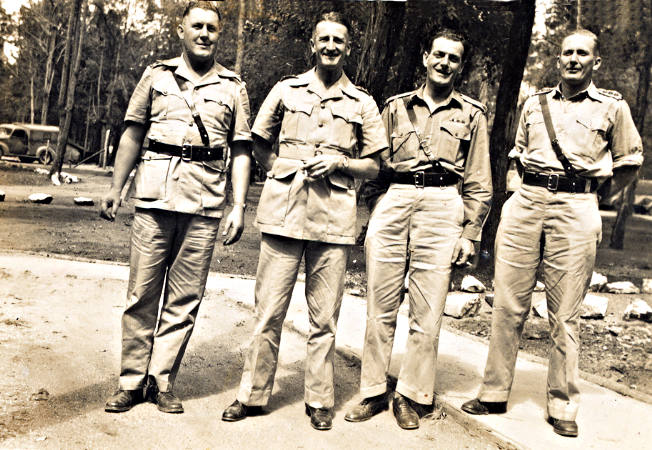
Major Simpson with fellow officers of the 2/8th Battalion. Courtesy Rowan Simpson.
For much of the time the battalion was in New Guinea Major Simpson served as second in command but in June 19, 1945 he transferred to the Australian Army Provost Company where he was appointed Australian Provost Marshall. Less than a month later he was promoted to the rank of Temporary Lieutenant Colonel at thirty six years of age. It was twenty days later on July 28, 1945 he married Frances Margaret Rowe at Portland. The following year he took up an appointment as Australian Provost Marshall at Southern Command and it was from there that he was discharged from the army in 1947 as a Lieutenant Colonel after being awarded the Australian Efficiency Decoration. He had been in the army for 2760 days of which 1078 had been service overseas. Nevertheless he said “I did what I could to get the army out of my thoughts as soon as I was demobbed, so that I could get back to being a policeman. Fighting was just an unpleasant job: I’d just as soon forget about it.” [24]
Claude Simpson resumed his work in the Victorian Police Force as a constable in the mobile traffic section stationed at Russell Street. This was certainly a dramatic change from the level of responsibilities he carried in the army over the previous few years. He settled down and passed the examinations necessary for promotion to senior constable, and returned to his earlier position of drill instructor at the Police Depot. There he was assessed by his Inspector as “a well conducted, reliable and efficient sub officer. A very efficient drill instructor who handles men very tactfully.” Superintendent Thomson later wrote, “In my opinion it would be very difficult indeed to find a more suitable person to have control of young policemen in the making.” [25] These assessments were repeated in later reports of senior officers as he received promotion and moved from one appointment to another. He made Sergeant in November 1955, Inspector Grade II in March 1963 and seven months later Inspector Grade One. Leaving the Depot he took charge of West Melbourne station and later Burwood. Then followed a period as police prosecutor in the City Court. His final appointment came in October 1965 when he was placed in charge of City Traffic Police. In the last year of his service in 1969 Superintendent L F Wright wrote, “Exemplary conduct and bearing. A dedicated and tireless worker who has ability and knowledge both of his duties and his staff. Has controlled a busy Division and large public gatherings in a manner that has reflected most favourably on the service and much credit to himself. I am most appreciative of his assistance at all times given both willingly and wholeheartedly. [26] On his retirement the Chief Commissioner of Police, S H Porter presented him with the Chief Commissioner’s certificate for ‘outstanding ability and devotion to duty.”
During his army service Claude Simpson and his growing family moved Tulip Grove, Cheltenham and it was from there Claude continued his service to the community. He maintained his earlier associations with the scouting movement and the Royal Life Saving Society. Throughout the Olympic games in 1956 he was an official at the pentathlon, athletics and pistol events. At the local school he served as president of the school council and served as a trustee on the board of a local cemetery. At the time of his death in 1991 he was 82 years old and it was at St Matthew’s Anglican Church, Cheltenham, at which he had been vicar’s warden at for over forty years, that a packed congregation said farewell. [27]
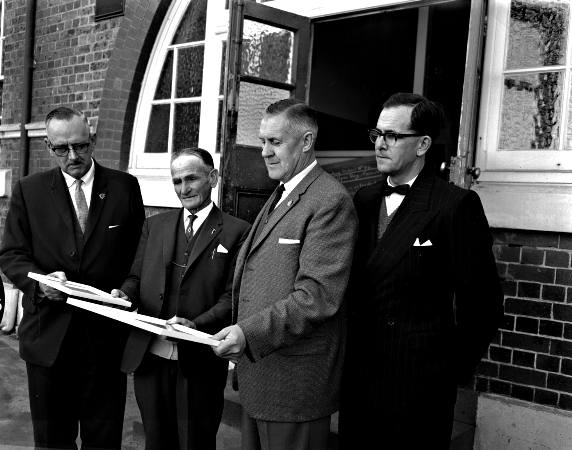
Claude Simpson with Everest Le Page, Principal Volk and J Sullivan at Cheltenham Primary School, 1962. Courtesy Leader Collection.
Footnotes
- Martin, H., Interview with Claude Simpson, 1991.
- Ibid.
- WW2 Nominal Roll – Commonwealth of Australia 2002 – Initially the 6th Division was organised in three brigades each consisting of four battalions but was later changed to conform to the British Infantry Army pattern. The 2/8th Battalion became part of the 19th Brigade but remained in the 6th Division.
- Martin, H., op. cit.
- Martin, H., op. cit.
- Long, Gavin, To Benghazi, 1986, page 68.
- Martin, H., op. cit.
- 20/7/40 page 50 – Australian Army War Diaries AWM52 8/3/8
- Martin, H., op. cit.
- Firkins, P., The Australians in Nine Wars, page 197
- Martin, H., op. cit.
- Lockwood, Douglas, Australia’s Pearl Harbour, 1966 Penguin Books, 1984, page 161.
- Lockwood, Douglas, ibid., page 164.
- Lockwood, Douglas, op. cit., page 202.
- Lockwood, Douglas, op. cit., page 192.
- Lockwood, Douglas, op. cit., page 192.
- Lockwood, Douglas, op. cit., page 195.
- Martin, H., op. cit.
- Martin, H., op. cit.
- Martin, H., op. cit.
- June 4, 1943 Battalion Diary.
- Personnel Records – National Archives of Australia.
- Personnel Records – National Archives of Australia.
- Moorabbin News, April 20, 1956.
- Victorian Police Personnel Records.
- Victorian Police Personnel Records.
- Moorabbin Standard News, October 2, 1991.
